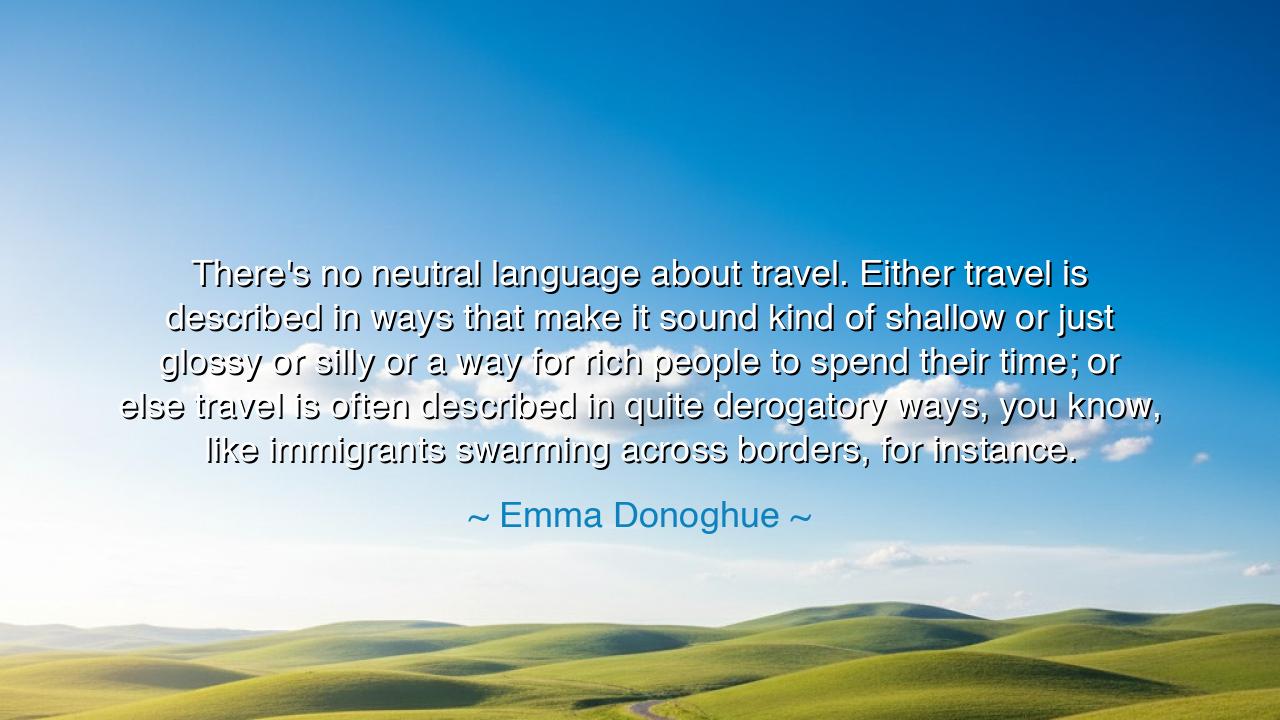
There's no neutral language about travel. Either travel is
There's no neutral language about travel. Either travel is described in ways that make it sound kind of shallow or just glossy or silly or a way for rich people to spend their time; or else travel is often described in quite derogatory ways, you know, like immigrants swarming across borders, for instance.






"There’s no neutral language about travel. Either travel is described in ways that make it sound kind of shallow or just glossy or silly or a way for rich people to spend their time; or else travel is often described in quite derogatory ways, you know, like immigrants swarming across borders, for instance." Thus spoke Emma Donoghue, and in her words we see the power of language laid bare. For travel, though as ancient as mankind itself, is rarely spoken of with balance or humility. It is either gilded in romance or tainted with fear. Her wisdom calls us to reflect not only on how we move across the earth, but how we speak of that movement, for words themselves can uplift or destroy.
The ancients themselves knew the might of language. Did not Homer adorn the wanderings of Odysseus with beauty, making his travels seem like sacred quests, even though they were filled with hardship? Did not Roman orators describe conquering legions as noble explorers, while dismissing displaced peoples as barbarians pressing at their gates? From the beginning, the act of moving from one land to another has been framed not by truth, but by the desires, fears, and biases of those who tell the tale. Donoghue reminds us that neutrality is rare, for our tongues are sharpened by judgment.
She names two extremes. On one hand, there is the glossy portrayal of travel: journeys packaged as luxury, framed as the pastime of the wealthy, stripped of hardship and deeper meaning. This is the painted mask that shows only beaches, wine, and sunsets, while concealing the true complexity of leaving one’s ground. On the other hand, there is the derogatory portrayal, wherein the desperate movement of immigrants—men, women, children in search of safety—is reduced to the language of invasion, as if humanity itself were a pestilence. These words do not merely describe; they shape how societies judge and act.
History reveals the danger of such speech. In the late 19th and early 20th centuries, millions of immigrants crossed the Atlantic, seeking new life in America. Some were welcomed as courageous pioneers, while others were scorned as unwanted hordes. The same movement of peoples was painted in opposite hues, depending on the mouths that spoke of it. Likewise, in World War II, refugees fleeing persecution were often denied sanctuary because the language used to describe them turned human suffering into suspicion and disdain. Indeed, the fate of countless lives has hinged not only on borders, but on words.
Children of tomorrow, hear this: how we speak of travel, of migration, of wandering, matters deeply. Words can transform a traveler into a hero, or reduce him to a criminal. They can exalt a journey as an adventure, or condemn it as a threat. Do not be careless with your speech. For every human who moves from one place to another carries with them a story, a burden, a hope. To describe them wrongly is to betray their dignity.
Practical wisdom lies here: examine the words you use. When you speak of the tourist, do not diminish their search for wonder. When you speak of the immigrant, do not strip them of humanity with cold metaphors of swarms or floods. Instead, strive for truth and compassion. Call them not invaders, but seekers; not burdens, but bearers of stories. For when your language honors the dignity of others, you become a builder of peace rather than a sower of division.
Thus the lesson is clear: travel is never neutral, because language itself is never neutral. Donoghue reminds us that we hold power not only in our deeds but in our words. The way we speak shapes how others are seen, treated, and remembered. Therefore, let your tongue be guided by wisdom. Speak with reverence of journeys, whether of leisure or of survival. For in honoring the movement of others, you honor the shared journey of all humanity across the earth.






AAdministratorAdministrator
Welcome, honored guests. Please leave a comment, we will respond soon